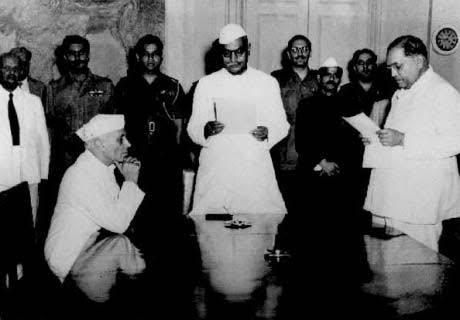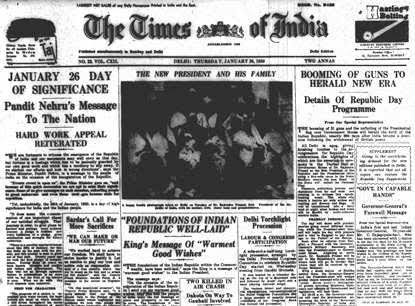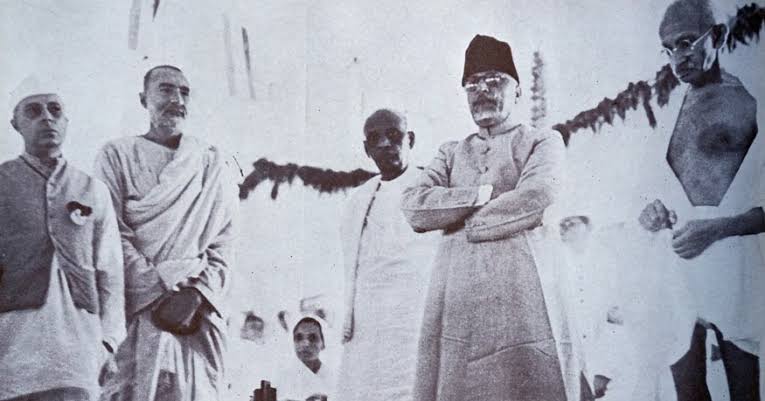
TEMPLES OF THE NEW AGE
08th JULY, 1954.
"I have occasion frequently these days to participate in functions marking the inauguration of some new work or completion of some other. Today, you and I and all these persons have gathered here on one such occasion.
(1/n).
08th JULY, 1954.
"I have occasion frequently these days to participate in functions marking the inauguration of some new work or completion of some other. Today, you and I and all these persons have gathered here on one such occasion.
(1/n).

I want to know from you what you think and feel in your minds and hearts on this occasion, because in my heart and mind there is a strange exhilaration and excitement, and many kinds of pictures come before me.
(2/n).
(2/n).
Many dreams we have dreamt are today drawing near and being materialised. For the materialisation of these dreams, we may praise one another, and those who have done good work should be praised. But how many can be praised when the list runs to thousands, nay, lakhs?
(3/n).
(3/n).
Let us give praise where it is due. The work which we see today, and in the inauguration of which we are participating, is much bigger than our individual selves. It is a tremendous thing.
(4/n).
(4/n).
I have told you that I, and undoubtedly many of you, have frequent occasion to participate in various functions. A foundation stone is laid somewhere; a building, a hospital, a school or a university is opened elsewhere.
(5/n).
(5/n).
Big factories are going up. Such activity is taking place all over the country because Mother India is producing various kind of things.
(6/n).
(6/n).
Among them, Bhakra-Nangal has a special place – Bhakra Nangal where a small village stood, but which today is a name ringing in every corner of India and in some parts of the world too, because this is a great work, the mark of a great enterprise.
(7/n).
(7/n).
About fifty years ago, an Englishman came here and for the first time had the idea that something could be done at this place, but the idea did not materialise. The matter was raised many times. Some rough plans were made but they were not pursued.
(8/n).
(8/n).
Then India became free. In the process, the Punjab suffered a great shock and a grievous wound. But despite the shock and the wound, freedom brought a new strength, a new enthusiasm.
(9/n).
(9/n).
And so with the wound, the worries and calamities, came this new enthusiasm and new strength to take up this big work. And we took it up. I have come here frequently.
(10/n).
(10/n).
Many of you also must have come and seen this slowly changing picture and felt something stirring deep within you. What a stupendous, magnificent work – a work which only that nation can take up which has faith and boldness!
(11/n).
(11/n).
This is a work which does not belong only to the Punjab, or PEPSU or the neighbouring States, but to the whole of India.India has undertaken other big works which are not much smaller than this. Damodar Valley, Hirakud and the big projects of the South are going on apace.
(12/n).
(12/n).
Plans are being made every day because we are anxious to build a new India as speedily as possible, to lead it forward, to make it strong and to remove the poverty of its people.
(13/n).
(13/n).
We are doing all this, and Bhakra-Nangal in many respects will be one of the greatest of these works, because a very big step in this direction is being taken here today after years of endeavor.
(14/n).
(14/n).
Every work we complete in India gives fresh strength to the nation to undertake new tasks.
(15/n).
(15/n).
Bhakra Nangal is a landmark not merely because the water will flow here and irrigate large portions of the Punjab, PEPSU, Rajasthan and fertilise the deserts of Rajasthan, or because enough electric power will be generated here to run thousands of factories and
(16/n).
(16/n).
cottage industries which will provide work for the people and relieve unemployment. It is a landmark because it has become the symbol of a nation’s will to march forward with strength, determination and courage.
(17/n).
(17/n).
That is why, seeing this work, my courage and strength have increased, because nothing is more encouraging than to capture our dreams and give them real shape.
(18/n).
(18/n).
Just before coming to Nangal, I was in Bhakra where the Dam is being built. I stood on the banks of the Sutlej and saw the mountains to the right and left. Far away, at various spots, people were working.
(19/n).
(19/n).
Since it was a holiday, there was not much work going on, for all the people had come here. Still there were a few persons working. From a distance they looked very small against the mighty-looking mountain through which a tunnel was being bored.
(20/n).
(20/n).
The thought came to me that it was these very men who had striven against the mountains and brought them under control.
(21/n).
(21/n).
What is now complete is only half the work. We may celebrate its completion but we must remember that the most difficult part still remains to be done – the construction of the Dam about which you have heard so much.
(22/n).
(22/n).
Our engineers tell us that probably nowhere else in the world is there a dam as high as this. The work bristles with difficulties and complications.
(23/n).
(23/n).
As I walked round the site I thought that these days the biggest temple and mosque and gurdwara is the place where man works for the good of mankind.
(24/n).
(24/n).
Which place can be greater than this, this Bhakra-Nangal, where thousands and lakhs of men have worked, have shed their blood and sweat and laid down their lives as well? Where can be a greater and holier place than this, which we can regard as higher?
(25/n).
(25/n).
Then again it struck me that Bhakra-Nangal was like a big university where we can work and while working learn, so that we may do bigger things. The nation is marching forward and every day the pace becomes faster.
(26/n).
(26/n).
As we learn the work and gain experience, we advance with greater speed. Bhakra-Nangal is not a work of this moment only, because the work which we are doing at present is not only for our own times but for coming generations and future times.
(27/n) .
(27/n) .
Another thought came to my mind when I saw the Sutlej. Where has it come from? What course has it traversed to reach here? Do you know where the Sutlej springs from? It rises near Mount Kailash in the vicinity of Mansarovar. The Indus rises near by.
(28/n).
(28/n).
The Brahmaputra also flows from that place in a different direction, reaching India and Pakistan after traversing thousands of miles. Other rivers rise from places near by and flow from Tibet towards China.
(29/n).
(29/n).
So the Sutlej traverses hundreds of miles through the Himalayas to reach here and we have tried to control her in a friendly way. You have seen the two big diversion channels. At present the whole river has been channeled through one canal.
(30/n).
(30/n).
After the rains we will divert the river completely in the two channels so that the dam might be built there.
I look far, not only towards Bhakra-Nangal, but towards this our country, India, whose children we are. Where is she going?
(31/n).
I look far, not only towards Bhakra-Nangal, but towards this our country, India, whose children we are. Where is she going?
(31/n).
Where have we to lead her, which way have we to walk and what mighty tasks have we to undertake? Some of these will be completed in our lifetime. Others will be taken up and completed by those who come after us.
(32/n).
(32/n).
The work of a nation or a country is never completed. It goes on and no one can arrest its progress – the progress of a living nation. We have to press forward.
(33/n).
(33/n).
The question is which way we have to take, how we should proceed, what principles, what objectives we have to keep before us. All these big questions crop up. This is not an occasion to tell you about them but we have to remember them always and not forget them.
(34/n).
(34/n).
When we undertake a big work we have to do so with a large heart and a large mind. Small minds or small-minded nations cannot undertake big works. When we see big works our stature grows with them, and our minds open out a little."____ Jawaharlal Nehru.
(n/n).
(n/n).
• • •
Missing some Tweet in this thread? You can try to
force a refresh










